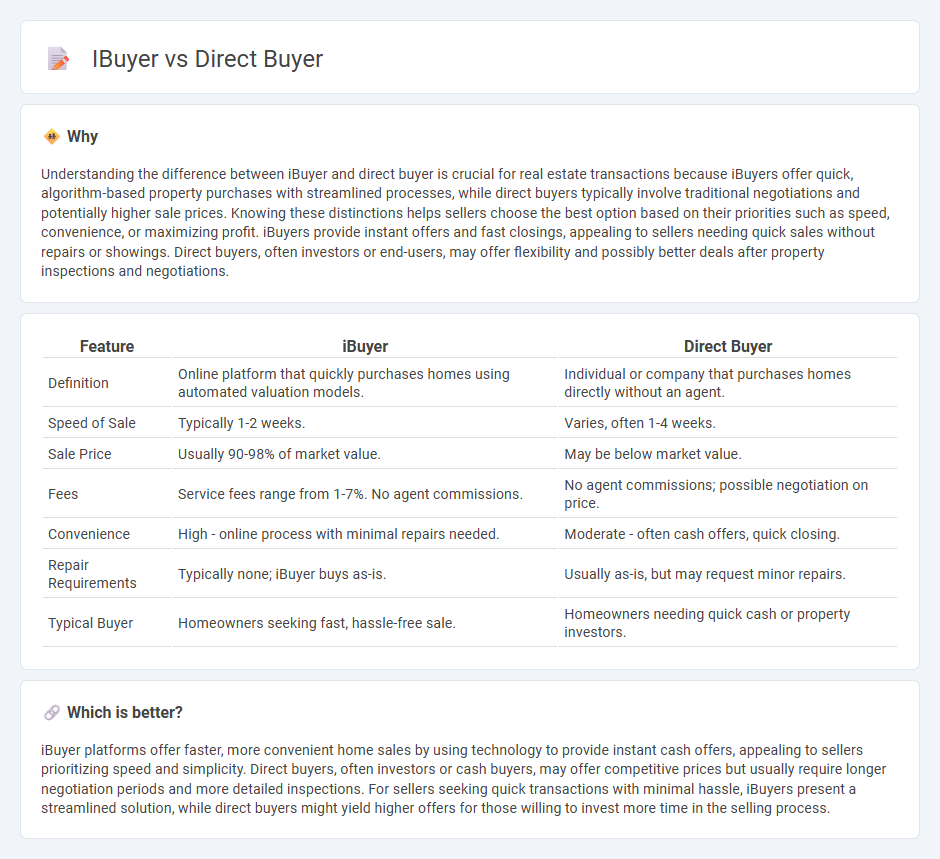
iBuyer platforms offer instant property offers using algorithm-driven valuations, streamlining the selling process with quick closings and minimal showings, while direct buyers typically engage through traditional negotiations, potentially offering higher sale prices with more flexibility. Understanding the differences between iBuyer speed and convenience versus direct buyer negotiation can impact your real estate transaction strategy. Explore detailed comparisons to determine which selling method suits your goals best.
Why it is important
Understanding the difference between iBuyer and direct buyer is crucial for real estate transactions because iBuyers offer quick, algorithm-based property purchases with streamlined processes, while direct buyers typically involve traditional negotiations and potentially higher sale prices. Knowing these distinctions helps sellers choose the best option based on their priorities such as speed, convenience, or maximizing profit. iBuyers provide instant offers and fast closings, appealing to sellers needing quick sales without repairs or showings. Direct buyers, often investors or end-users, may offer flexibility and possibly better deals after property inspections and negotiations.
Comparison Table
| Feature | iBuyer | Direct Buyer |
|---|---|---|
| Definition | Online platform that quickly purchases homes using automated valuation models. | Individual or company that purchases homes directly without an agent. |
| Speed of Sale | Typically 1-2 weeks. | Varies, often 1-4 weeks. |
| Sale Price | Usually 90-98% of market value. | May be below market value. |
| Fees | Service fees range from 1-7%. No agent commissions. | No agent commissions; possible negotiation on price. |
| Convenience | High - online process with minimal repairs needed. | Moderate - often cash offers, quick closing. |
| Repair Requirements | Typically none; iBuyer buys as-is. | Usually as-is, but may request minor repairs. |
| Typical Buyer | Homeowners seeking fast, hassle-free sale. | Homeowners needing quick cash or property investors. |
Which is better?
iBuyer platforms offer faster, more convenient home sales by using technology to provide instant cash offers, appealing to sellers prioritizing speed and simplicity. Direct buyers, often investors or cash buyers, may offer competitive prices but usually require longer negotiation periods and more detailed inspections. For sellers seeking quick transactions with minimal hassle, iBuyers present a streamlined solution, while direct buyers might yield higher offers for those willing to invest more time in the selling process.
Connection
iBuyer and direct buyers both streamline the real estate transaction process by offering quick cash offers without traditional market listings. iBuyers use algorithms and market data to provide instant offers, appealing directly to sellers seeking fast, hassle-free sales. This connection enables homeowners to bypass traditional buyers and real estate agents, facilitating faster property sales with reduced negotiation.
Key Terms
Offer Process
Direct buyers typically provide a straightforward offer process by purchasing homes without contingencies, enabling faster closings and reducing uncertainty for sellers. iBuyers use automated valuation models and technology-driven platforms to generate instant offers, streamlining the transaction but potentially offering slightly lower prices compared to traditional buyers. Explore the differences in offer processes to determine which option best suits your selling needs.
Closing Timeline
Direct buyers typically offer faster closing timelines, often completing transactions within 7 to 14 days due to streamlined processes and fewer contingencies. iBuyers use technology-driven models to provide quick offers and can close in as little as 10 to 21 days, but fees may be higher compared to direct buyers. Explore the advantages and timelines of both options to determine the best fit for your property sale.
Service Fees
Direct buyers often avoid traditional service fees by purchasing homes outright, offering sellers quick closings without real estate agent commissions. iBuyers charge service fees ranging from 6% to 14%, which include convenience and fast transaction benefits but can reduce overall sale proceeds. Explore the detailed cost comparisons and service structures between direct buyers and iBuyers to make an informed selling decision.
Source and External Links
What Is A Direct Buyer In Real Estate? - Explains the concept of direct buyers in real estate, who purchase properties directly from homeowners without real estate agents.
What Is a Direct Home Buyer and Are They a Good Option? - Discusses the benefits and drawbacks of selling to direct home buyers, highlighting quick sales and cash offers.
About Direct Buyers - Introduces Direct Buyers as a family-owned business offering fast and reliable cash home buying services with over 30 years of experience.
 dowidth.com
dowidth.com